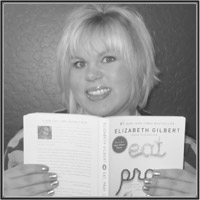Britney Gulbrandsen is an Interview Editor at Superstition Review. When not interviewing authors she spends her time reading, writing, crafting and spending time with her family.
 I’ve recently been asked the question, “How do you write?” The question has been posed several different ways, the language varied depending upon the person asking, but the message remains the same: what is my process for writing?
I’ve recently been asked the question, “How do you write?” The question has been posed several different ways, the language varied depending upon the person asking, but the message remains the same: what is my process for writing?
Well, my first reaction to this question was, “I just put my pen to paper—or fingers to keyboard, depending upon my mood—and write.” But I wasn’t going to get out of the question that easily. So I examined my process more closely to think of what my method actually was.
Here is what I came up with:
- Sit down with a blank page looming in front of me.
- Turn on some light music (my writing playlist on iTunes).
- Stare into oblivion.
- Check my email.
- Update my Facebook status.
- Turn to my list of ideas or my list of things that inspire me.
- Check my email again.
- Finally begin to write.
Now I know that sounds like a joke, but ninety percent of the time, that is actually what I do when I sit down to write. But the real depth of my process comes from the tips I’ve gained and learned from experience.
My Tips:
- Read as much as I possibly can. I’m a firm believer that the more you read, the better you will write.
- Read the genres that I want to write, as well as many others. I read everything: novels, short stories, poetry, essays, memoirs, magazines, newspapers, articles, blogs, etc.
- Keep pieces that inspire me near my writing desk. When I’m feeling a lack of creativity, I turn to one of them.
- When an idea comes to me, I write it down immediately. I’ve learned through experience that I won’t stop and write things down in a notebook I carry with me. It just won’t happen. But I do have an app on my phone that allows me to write notes to myself as well as to make checklists. So when I think of something intriguing that might work itself into a story, I quickly type it into my phone. Then I transfer it to paper later on when I have more time.
- Develop my characters. This is crucial. Characters will transform the story. When writing a longer work, such as a novel, I get to know my main character(s) before I begin to write. I go through every detail until I feel that, in a way, I have become my character. This means that I work through the character’s hobbies, fears, dreams, motivation, favorites (movie, book, food, song, store, activity, etc.) most tender memory, what he/she would grab in a fire, every aspect of what that character looks like, each personality trait, and much more. I want to get to know my characters from the inside out. Generally, most of this information won’t make it into the actual story itself, but it will help me understand my character so I will know what he/she would do or say in a certain situation.
- If I need to stop writing before I finish the story, I go back and reread the past few sentences or so before I sit down to write the next time. This helps get me back in the mindset of my story and characters.
- I write down everything that comes to my mind. Lots of things won’t make it into my final draft, but none of that matters now. Something raw—even a list of sorts—can help lead me to some revelation later on. The first write-through is for ideas. It’s all about getting the story out.
- Let go of whatever ending I have in mind if it just doesn’t work. I once had this “grand” idea for a short story that I had created from beginning to end in my mind. When I finished actually writing it, I realized the ending didn’t work. My character would never do what he did in my story. So I erased that portion and let my character guide me based on what he would actually do. The ending is so much crisper and realistic now.
- Revise, revise, revise and then be done with it. I’ve learned that I can always make changes to my work. In my mind, it will never be good enough to get published. I may think it’s ready, but if I put it away for a week, take it out, read it again, I will inevitably find something to change. But at some point, enough is enough. It’s time to try to get it published.
I’m learning more and more every day. Each time I sit down to write, I learn something new. But the biggest thing I’ve learned is to just write.
